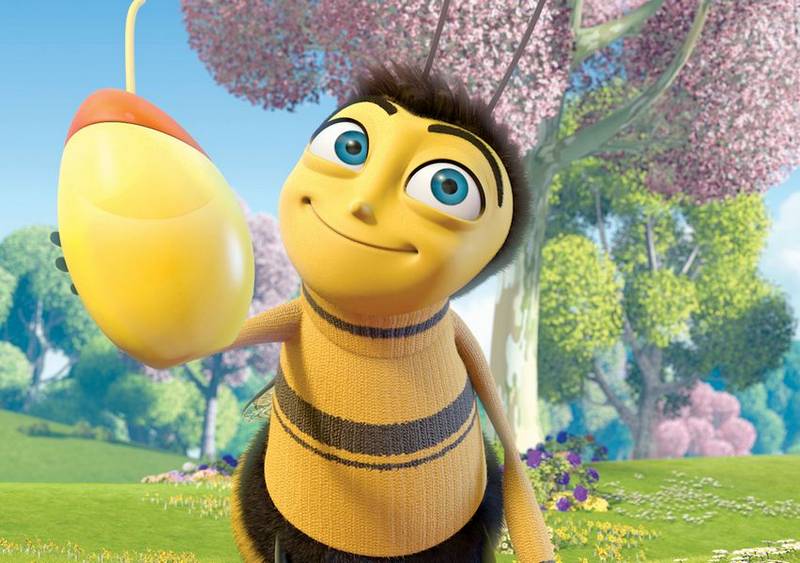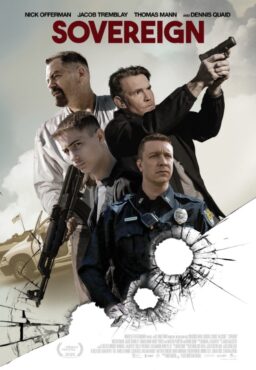Q: One of the things that’s been bugging my inner biology geek about “Bee Movie” is that Jerry Seinfeld is the wrong sex to be a worker bee. All worker bees are female, and they’re the only ones who would ever have to worry about pollination, honey-making and all the other things the movie identifies as being general bee behavior. Last year, “Barnyard” made a similar mistake, by giving udders to male cows, and received widespread derision for it.
Zach Buchan, Minneapolis
A. Dr. Richard Iacobucci has made a video, “Beginning Beekeeping,” that may provide a clue for the decision to reverse the movie’s genders. He writes: “Male bees are called drones. They lead a life of leisure, doing no work while being fed by the workers. Their sole purpose is to mate with a queen from any hive, thereby transferring the genetic traits of their mother. They die upon mating, or are expelled from the hive as winter approaches.”
So either have Jerry play a worker bee, or have him face dire consequences. But it gets more complicated. Jerry’s character, Barry B. Benson, gets upset that humans are stealing all the honey, but Frank B. Chavez III of Hayward, Calif., writes me: “Someone should have told Seinfeld that honey, what we eat, is actually what the bees vomit up. It’s a waste product, and when we take it, the bees are likely glad to be rid of it.” So now we are looking at a movie where Barry fights to defend vomit and dies. Now there’s a movie that would qualify for a special category in the Insect Fear Film Festival at the University of Illinois: movies about what insects fear.
Q. Regarding Sting’s animated appearance in “Bee Movie”: singer and bass player Gordon Sumner got the nickname “Sting” in the mid-1970s when he had a penchant for wearing a black and yellow striped sweater that, according to a mate in the pre-Police band Last Exit, made him look like a bumblebee. Other members of the Police were photographed wearing the striped T-shirts that were so popular in the late ’70s and early 1980s, but Sting was the earliest adopter, and so got the unusual moniker. Lucky for him, he didn’t get dubbed “Bee” or “Wasp.” I can’t picture an English musician named “Bumblebee” moving many units.
Julia Spencer, Austin, Texas
A. Other bad rock star names: Gnat, Fly, Aphid, Spittlebug and 17-Year Periodical Cicada.
Q. I have to say I’m a bit suspicious about the Answer Man question from “Alan Partridge” of “Manchester, Pa.” about the movie “Control.” Considering “Alan Partridge” is a character played by Steve Coogan, who portrayed Tony Wilson in “24 Hour Party People” (also touching on the story of Joy Division, and which answers both of the questions “Partridge” asked), and “Manchester” is the city that Joy Division hailed from, I smell a fake reader here.
Graham Knight,Jacksonville, Texas
A. I decided to track down “Alan Partridge,” but the odd thing is, even though Google Mail has vast storage and keeps everything, I couldn’t find his original message. This is where we cue the theremin music.
Q. In your review of “No Country for Old Men,” you ask, “Why does Chigurh have the corresponding tracker?” I think the businessman (Stephen Root) was buying the drugs from someone in Mexico. He had the transponder put in his satchel of money for obvious reasons. When the deal went bad, he hired Chigurh to find the money.
Chigurh went out to the scene with two of the businessman’s associates. He got the tracker from them and then he killed them. The businessman also gave a tracker to “the Mexicans” without telling Chigurh, apparently figuring the more people hunting for his money, the better. That is how “the Mexicans” found Llewelyn Moss at the hotel, and it is explained when Chigurh busts into the businessman’s office and kills him. Chigurh says something like “you gave a second tracker to the Mexicans.”
When the businessman learned that Chigurh went rogue, he hired Carson Wells to track down Chigurh. I think that’s how it fits together. I think all the clues are there in the movie, but I agree that they are subtle and hard to piece together. It is not easy to piece things together in the book, either, though it is interesting how the movie and book bring out different nuances and clues.
David Scott, Chicago
A. Yes, but my solution was very ingenious, considering it was wrong.
Q. In your review of “No Country for Old Men,” you write that the name Chigurh, like many of Cormac McCarthy’s words, “is employed like an architectural detail: The point is not how it sounds or what it means, but the brushstroke it adds to the sentence.” It’s a fine point that gets sidelined in most discussions of literature: So much of great prose lies in how it appears on the page.
A glyphic name like Chigurh is literally unspeakable (though we can imagine how it must sound), and this makes the character and his actions all the more unfathomable on the page. It’s a tribute to the Coens and Javier Bardem that their Chigurh is even half as terrifying in the flesh as he is in the novel.
Jon Crylen, Chicago
A. However, I think we have a pronunciation. Normand Duern of Ottawa, Ont., writes: “The pronunciation of Chigurh is actually indirectly given in Cormac McCarthy’s book, in an easily overlooked passage where a character is told Anton Chigurh’s name, and responds quizzically by saying: ‘Sugar?'”
My theory: When the family came through Ellis Island, the grandfather coughed. Actually, you find women of a certain age making the same sound when telling you how old they are, and after-dinner speakers using it to substitute for a dirty word.
Q. What if someone offered you a job reviewing films before they are released, so that they could be improved based on what you’d have to say? Presumably, you agree this would undoubtedly lead to better films. But is there some reason to think that it would not be a good thing in the long term? Is there some dynamic (aesthetic, psychological, ethical, whatever) that would, in principle, make this a very bad idea?
What would you say?
Malcolm Watt, St. Louis
A. Chigurh!
Q. I have been a reader of your reviews online as long as I have had Internet access. My favorite time to read your reviews has been at work on Fridays. Admittedly, I should be working while at work, but these little breaks to read your reviews don’t take too much time away from my day, and I’m probably more productive when allowed this small diversion.
Recently, though, I’ve lost my access. My company now blocks your Web site, along with all other “entertainment” ones. I’m sure a big reason for this is to stop employees from “wasting” company time. Rather than stopping us, they’ve just forced us to waste more time and assets to get what we want. In my case, I have a friend at a competing company who kindly prints your reviews, scans them and e-mails them to me. I then print them at work and read them. The whole process probably takes twice as long as just reading your articles would. I’m not sure what I hope for as a response, though “well done, Dan! Keep fighting the good fight!!” has a nice ring to it.
Dan, Boston
A: Well done, Dan! Keep fighting the good fight! And aren’t you happy I didn’t print your last name! By the way, a recent issue of the Onion has this headline: “Study Finds Working at Work Improves Productivity.”












